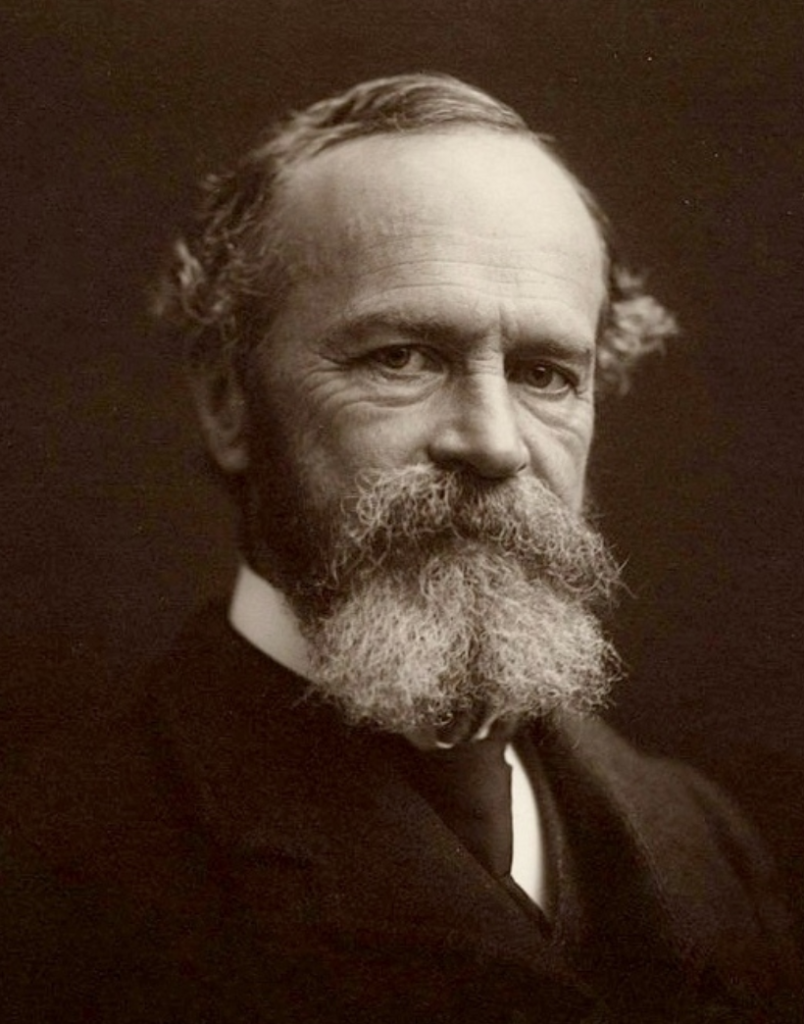William James is an American Philosopher and Psychologist during the period 1842 – 1940 in his contribution towards philosophy with psychological influences. He is considered to be a leading thinker of the late nineteenth century, one of the most influential philosophers of the United States and the “Father of American psychology”.

His important achievements and associations include the establishment of the first teaching lab and offering the first psychology course in the United States in 1875 at Johns Hopkins University. He was ranked as the “14th most eminent psychologist of the 20th century” by a survey and in another survey he was ranked 2nd which showed his high reputable achievements of his time. He was the founder of the American Society for Psychical Research as well as a champion of alternative approaches to healing. He was also the president of the British Society for Psychical Research. Ralph Waldo Emerson who was himself a famous philosopher and transcendentalist was his godfather. There were many of his students who became renowned for their own philosophical or psychological and other endeavors of their own. His students enjoyed his brilliance and his manner of teaching was free of personal arrogance. They remember him for his kindness and humble attitude. His respectful attitude towards them speaks well of his character.
He was born into a wealthy Swedenborgian theologian family and his father was called Henry James Sr. where the family was well acquainted with the literary and intellectual elites of his day. James suffered from a variety of physical conditions, including those of eyes, back, stomach and skin of which he continuously sought out natural remedy for his ailments. He was also tone deaf.

Although adept in medicine, his true interest lies in philosophy and psychology. James studied medicine, physiology, and biology, and began to teach in those subjects, but was drawn to the scientific study of the human mind at a time when psychology was constituting itself as a science. He since have notable contributions where he was regarded highly for New Thought which holds that “Infinite Intelligence” or God as he defined “is everywhere, spirit is the totality of real things, true human selfhood is divine, divine thought is a force for good, sickness originates in the mind and ‘right thinking’ has a healing effect”.
His core beliefs include :
1) God or Infinite Intelligence is “supreme, universal and everlasting”;
2) divinity dwells within each person, that all people are spiritual beings;
3) “the highest spiritual principle is loving one another unconditionally…and teaching and healing one another”; and
4) “our mental states are carried forward into manifestation and become our experience in daily living”.
Such powerful insights and awareness constituted the New Thought movement during the late nineteenth century. Another influential and important thought-provoking idea was that of an emotion in terms of a sequence of events that starts with the occurrence of an arousing stimulus. This stimulus stems from the “sympathetic nervous system” which is responsible for its role in responding to dangerous or stressful situations such as ‘fight or flight’ or the parasympathetic nervous system which is responsible for the body’s rest and digestion response when the body is relaxed, resting, or feeding accounting for the ‘rest and digest’ functions. And the emotion will end with an emotional feeling and a conscious emotional experience. James set out to answer his question by asking : “do we run from a bear because we are afraid or are we afraid because we run? He proposed that the obvious answer, that we run because we are afraid, was wrong! And instead argued that we are afraid because we run!” What James proposes is that emotions are often accompanied by bodily responses like racing heart, sweaty palms, tense muscles which fall under the sympathetic nervous system. He notes that we can sense what is going on inside our body much the same as we can sense what is going on in the outside world. Isn’t this similar to the universal law of “As within, so without”?
According to James, when we see James’s bear, we run away. During this act of escape, the body goes through a physiological upheaval: blood pressure rises, heart rate increases, pupils dilate, palms sweat, muscles contract in certain ways (innate defense mechanisms which are indicative of karmic patterns). Other kinds of emotional situations will result in different bodily upheavals. In each case, the physiological responses return to the brain in the form of bodily sensations, and the unique pattern of sensory feedback gives each emotion its unique quality. Fear feels different from anger or love because it has a different physiological signature (the parasympathetic nervous system for love). The mental aspect of emotion, the feeling, is a slave to its physiology, not vice versa: we do not tremble because we are afraid or cry because we feel sad; we are afraid because we tremble and are sad because we cry. In modern science, it is already widely known that our parasympathetic nervous system tells our brain what’s happening, instead of our brain telling our body what to do. This is the reason why we can overwrite negative emotional impulses whenever we “will” ourselves to take a deep breath or put a smile on our face. The moment we break out of the sympathetic nervous system response by affecting the parasympathetic nervous system instead, we send a signal to our brain to respond according to the output not the input.
When our parasympathetic nervous system goes array, it will kick in the sympathetic nervous response of “fight or flight” even in unrelated relatively tranquil settings like going for a “zoom meeting, group presentation, meeting an authoritative figure or any other types of non-danger events”. The remedy for this are many which includes practicing deep breathing exercises, meditation, yoga, massages, nature walks, playing with children or animals, watching comedy and laughing, gardening, listening to calming music especially therapeutic frequency music. These types of practices will put us back into sync with creation and nature and in turn reset our parasympathetic nervous system into rest and relaxation.

Mystical states, according to James, had four qualities to it : 1) “Ineffability”, meaning they defy adequate description, they must be experienced directly, they cannot be transferred to another. In this peculiarity, mystical states are more like states of feeling than states of intellect. No one can make clear to another who has never had a certain feeling, in what the quality or how it feels and the experience of it. 2) “Transiency”, means that the state is short-lived. Mystical states often do not stay for prolonged periods of time. 3) “Passivity”, this means that the onset of mystical states often consumes the entire experiential domain of the person. It is an immersive experience where one’s attention and perception is totally captivated by the mystical state not cognizant of the surroundings or progression of time. 4) “Noetic quality”, translates to a state of fundamental “knowing”. It is a direct knowing imbued by an inner wisdom from within. Although so similar to states of feeling, mystical states were in fact experienced as states of “divine knowledge”. They are states of insight into depths of truth beyond the intellect. They are illuminations, revelations, carrying significance and importance. It is an unexplainable “knowing” experience where one seems to encounter ‘ultimate reality’. Interestingly, these states often carry a sense of authority and realness “more real than reality”. It carries a lasting sense of truth. The noetic quality suggests that there is a channel for knowledge beyond the logical or rational faculties of the mind and that this objective knowledge holds tremendous value for the individual receiving it. Subjects of mystical experiences often report that the experience allowed them to see truths about themselves and reality that were not previously known.
Hence to summarize mystical state :
1) Ineffability – Words are inadequate to describe it.
2) Transiency – It doesn’t last. It is temporary.
3) Passivity – Totally immersive experience of its own not involving the ego and will-power.
4) Noetic quality – Direct knowledge of the divine.

James believed that our moral values and conduct which we strived to realize will somehow survive us because of the dynamic relationship we have with God or Divine Source. When we are doing the “right thing” we will be aligned and be able to navigate this earth experience. James depicts God or Divine Source as to a master chess player engaged in a give-and-take with us novices. We are free to make our own moves; yet the master knows all the moves we could possibly make, the odds of our choosing one over the others, and how best to respond to any move we choose to make. There will be no mistakes in living right so that we may be well guided and live in abundance by doing the right thing, walking the right path, doing the right action and living a right life.
